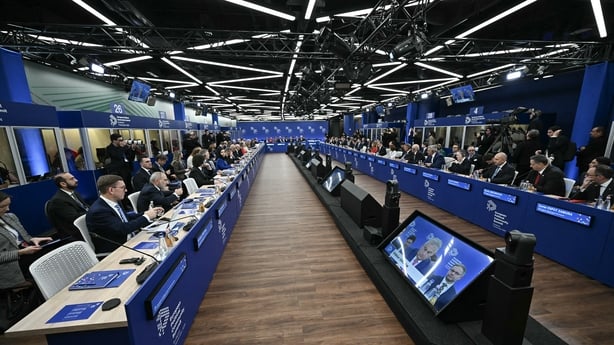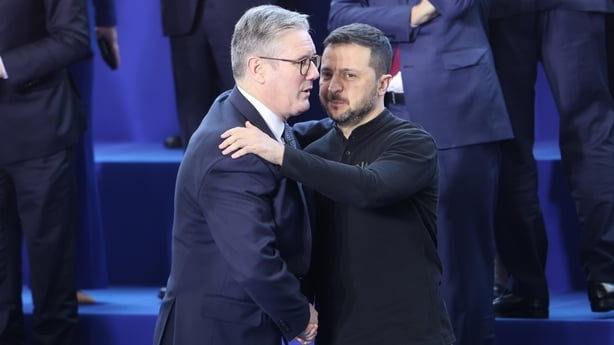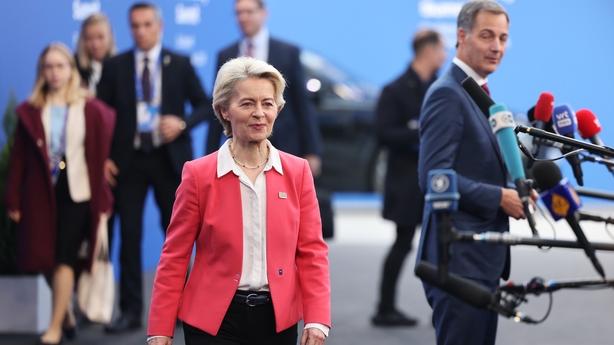Russian President Vladimir Putin has said he was "ready" to hold discussions with "courageous" Donald Trump, as he congratulated him on his victory in the US presidential election.
"I take this opportunity to congratulate him," Mr Putin said in remarks to the Valdai forum in the southern city of Sochi.
Asked whether he was open to holding talks with Mr Trump, the Russian leader said: "Ready".
Ahead of the US vote, Mr Putin had publicly said he would prefer to see Joe Biden, and then Kamala Harris, in the White House, when asked which candidate might be best for Russia.
But Moscow has long been seen as welcoming Mr Trump's anti-establishment credentials and the chaos he has injected into American and global politics.
Moscow was widely accused of interfering in the 2016 presidential election to boost Mr Trump's campaign against Hilary Clinton. The Kremlin has repeatedly rejected those charges.
The Kremlin leader also said he was impressed by how Trump handled himself during an assassination attempt at a rally earlier this year.
"He turned out to be a courageous person," Mr Putin said.
"People show who they are in extraordinary circumstances. This is where a person reveals himself. And he showed himself, in my opinion, in a very correct manner, courageously. Like a man," Mr Putin said.

Taoiseach says risk of transatlantic trade shock has increased, but hopes to talk with Trump
Earlier, Taoiseach Simon Harris acknowledged that the risk of a transatlantic trade shock had increased, but described Mr Trump as "transactional" adding that he would understand that US-EU trade is a two-way relationship.
Mr Harris was speaking as he arrived at the European Political Community summit in Budapest, a grouping of 47 European countries including the 27 member states of the European Union.
The meeting comes as Mr Trump's victory in the US Presidential election stokes fears in Ukraine over the United States' long-term commitment to support Ukraine against the Russian invasion.
Ukrainian President Volodymyr Zelensky is among those attending the summit.
Mr Harris said he hoped to speak to Mr Trump following his election victory.
He told reporters: "Mr Trump has won the election of the United States decisively, and obviously, the European Union and Ireland will now work with [the] democratically elected president elect of the United States.
"Europe and Ireland have already worked with President Trump in his previous administration.
"I think it's now important that in the days, weeks and months ahead, we assess what President Trump may do versus the various policies that he has outlined."
He added: "President Trump is a businessman. He is somewhat transactional, and I think he will understand that the relationship in terms of trade is a two-way relationship.
"Whilst there are many, many jobs in Ireland as a result of US foreign direct investment, there are also now Irish jobs from Irish owned companies in every single state in the United States of America."
We need your consent to load this rte-player contentWe use rte-player to manage extra content that can set cookies on your device and collect data about your activity. Please review their details and accept them to load the content.Manage Preferences
Mr Harris said the Government had invested budget surpluses in sovereign wealth funds to protect the Irish economy from any transatlantic or European shock in the years ahead.
"We do need to be aware that the risk of a transatlantic trade shock has now increased. I think that is a statement of fact.
"But we need to work our way through all of these things that we need to engage with the new administration at a European level.
"Trade is at an EU level, companies locate in countries for many reasons, not just tax, and at the end of the day President Trump will understand this as a businessman too," he added.
"The European Union is a major market. It is a major market and a major opportunity for the US to do business with EU and for the EU to do business with the United States.
"Ireland has always offered not just a competitive tax offer, and not just worked at a global level in terms of settling those tax issues in terms of rates, but we've also offered talent.
"We've also offered access to the European Union.
"We've also offered being a country that can bridge the Atlantic in terms of the US and the EU."

European Commission President looks forward to working with Mr Trump
European Commission President Ursula von der Leyen has said that she is looking forward to working with Mr Trump again to strengthen the transatlantic bond.
Speaking in Budapest, she said: "I have some experience with working with President Trump," adding it was very important that the two "analyse together what our shared interests are and work on that."
Hungarian Prime Minister Viktor Orbán is a vocal supporter of Mr Trump and has criticised US aid to Ukraine.
The Hungarian leader has also questioned Europe's financial support for Ukraine and criticised sanctions on Russia over the invasion.

Mr Orbán is hosting the meeting by virtue of Hungary’s presidency of the European Union.
He drew sharp criticism inside the EU for flying to Moscow in July for talks with Russian President Vladimir Putin at the start of Hungary's presidency, days after he had met with Mr Zelensky in Kyiv.
Mr Orbán and the Ukrainian President have had thorny relations throughout the war, with the Hungarian leader having called Mr Zelensky an "opponent" and criticising a "victory plan" put forward by Mr Zelensky that calls for a ramp-up in western support.
The meeting is also overshadowed by the collapse of the German coalition and what that might mean for European resilience.
Additional reporting Tony Connelly

